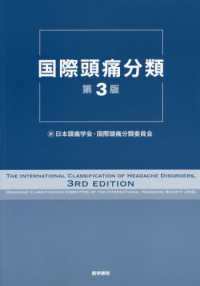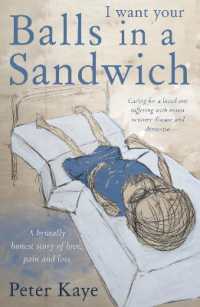- ホーム
- > 洋書
- > 英文書
- > Psychology
Full Description
Originally published by Whurr in 1995, PCCS Books is very pleased to be re-issuing this excellent and still popular book. This book poses a number of everyday questions, such as 'What makes us tick?' 'Where do my values come from?'How did I become who I am?' and 'Why are relationships so important?' In his acclaimed authoritative and accessible style, Tony Merry explores each of these issues, showing how and why person-centred psychology takes an optimistic view of human nature. In the process, he also provides some novel ideas to help explain why people behave the way they do. This book looks at how person-centred psychology can make a positive contribution to education, multiculturalism, power issues and living constructively with each other, as well as to counselling and psychotherapy. This work is intended for psychology undergraduates, trainee and beginning nurses, teachers, support workers, counsellors and psychotherapists who want a practical exploration of person-centred psychology. *Please be aware - this book is reproduced from a scanned original document. In some cases the text appears with a few slight imperfections, but this doesn't effect the standard of legiblity.*
Contents
1. Introduction: The origins and growth of person-centred psychology 2. What makes us tick? 3. How did I become who I am? 4. If people are so constructive, why do they do such destructive things? 5. Where do my values come from? 6. How much free choice do I really have? 7. Can I love somebody, and still be myself? 8. What do I want from life? 9. Why are relationships so important? 10. How do person-centred therapists help? 11. Can person-centred values be 'lived' in the classroom? 12. Who will listen to the children? 13. Can schools be more caring? 14. Can school students really be trusted? 15. Can person-centred psychology work in a multicultural society? 16. Does person-centred psychology work with groups? 17. Can understanding lead to peace? Appendix: An interview between Carl Rogers and Ms G.








